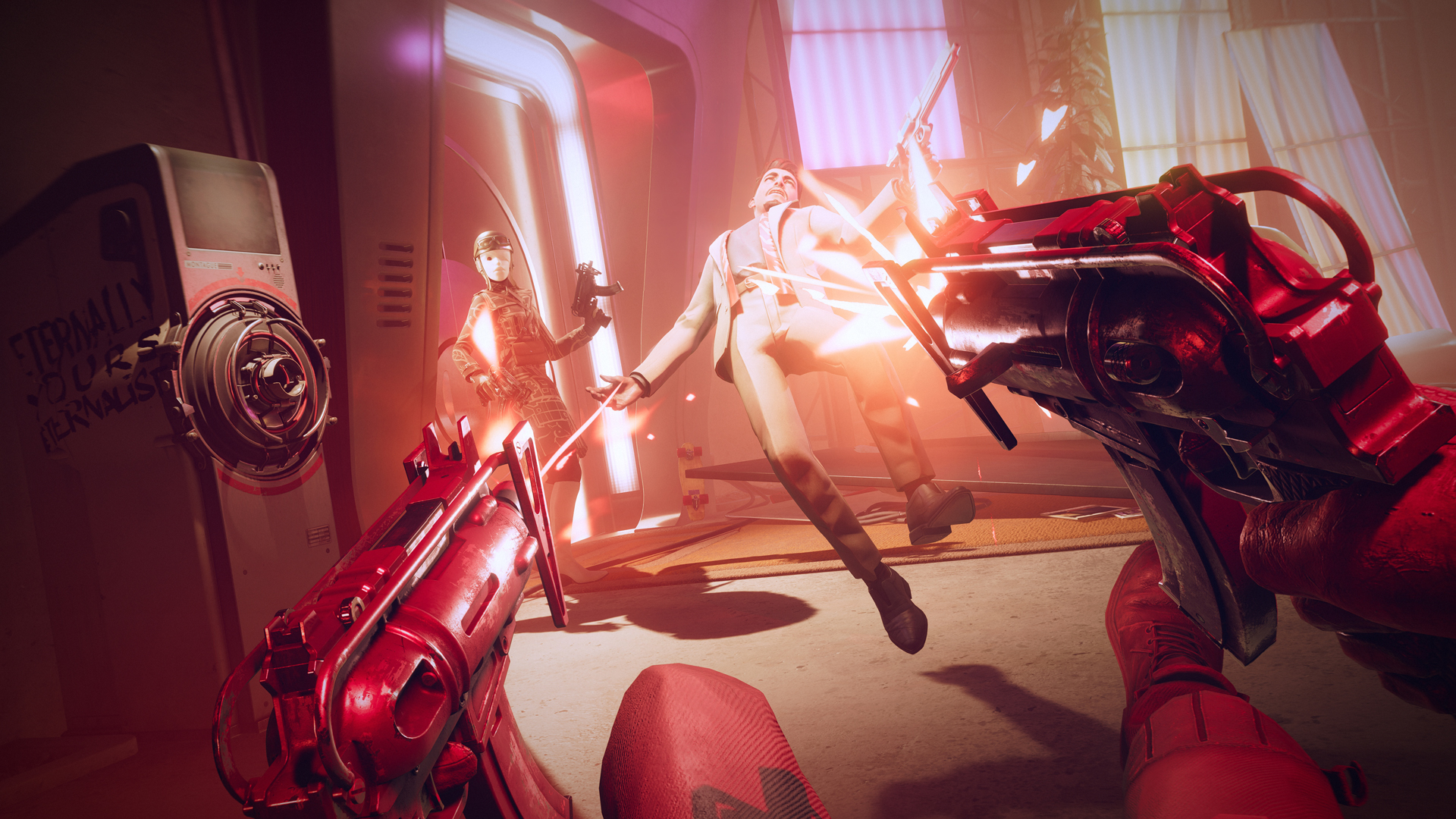GamesRadar+ Verdict
Deathloop is a killer new-generation showcase that will keep you guessing until the very end
Pros
- +
+ Rarely feels repetitive
- +
+ Fascinating structure
- +
+ Boundless style
Cons
- -
Shooting can be sticky
- -
Story doesn't reach a satisfying conclusion
Why you can trust GamesRadar+
Deathloop doesn't have functioning toilets. The light switches on the Isle of Blackreef don't work either. Do either of these observations really matter in the grand scheme of things? No, not particularly. Do I feel inclined to raise them all the same? Yes, absolutely. Pedantry is a reaction Arkane Studios must be all too familiar with by now; the developer has thoroughly earned its reputation for building some of the most wondrously detailed and immersive worlds in the modern era. You have no choice but to pick at the occasional loose thread because there is so little to criticise about the larger tapestry.
Given that I've opened up this review by talking about Blackreef's bathrooms, you can probably see where I'm going with this already: While Deathloop may share some common design ethos with Dishonored and Prey, it's a fundamentally different experience. Arkane establishes this early, with the first locked door you encounter. I do it almost on instinct, punching 0451 into the keypad and expecting it to swing open. Instead, I'm met with a blinking red light as Captain Colt Vahn growls something about 'old habits dying hard' – a PlayStation Trophy pops, a consolation prize for the infamous immersive sim cheat code not working on Blackreef either. I'll promise you this, you've never played an Arkane game quite like Deathloop before.
Worlds Apart
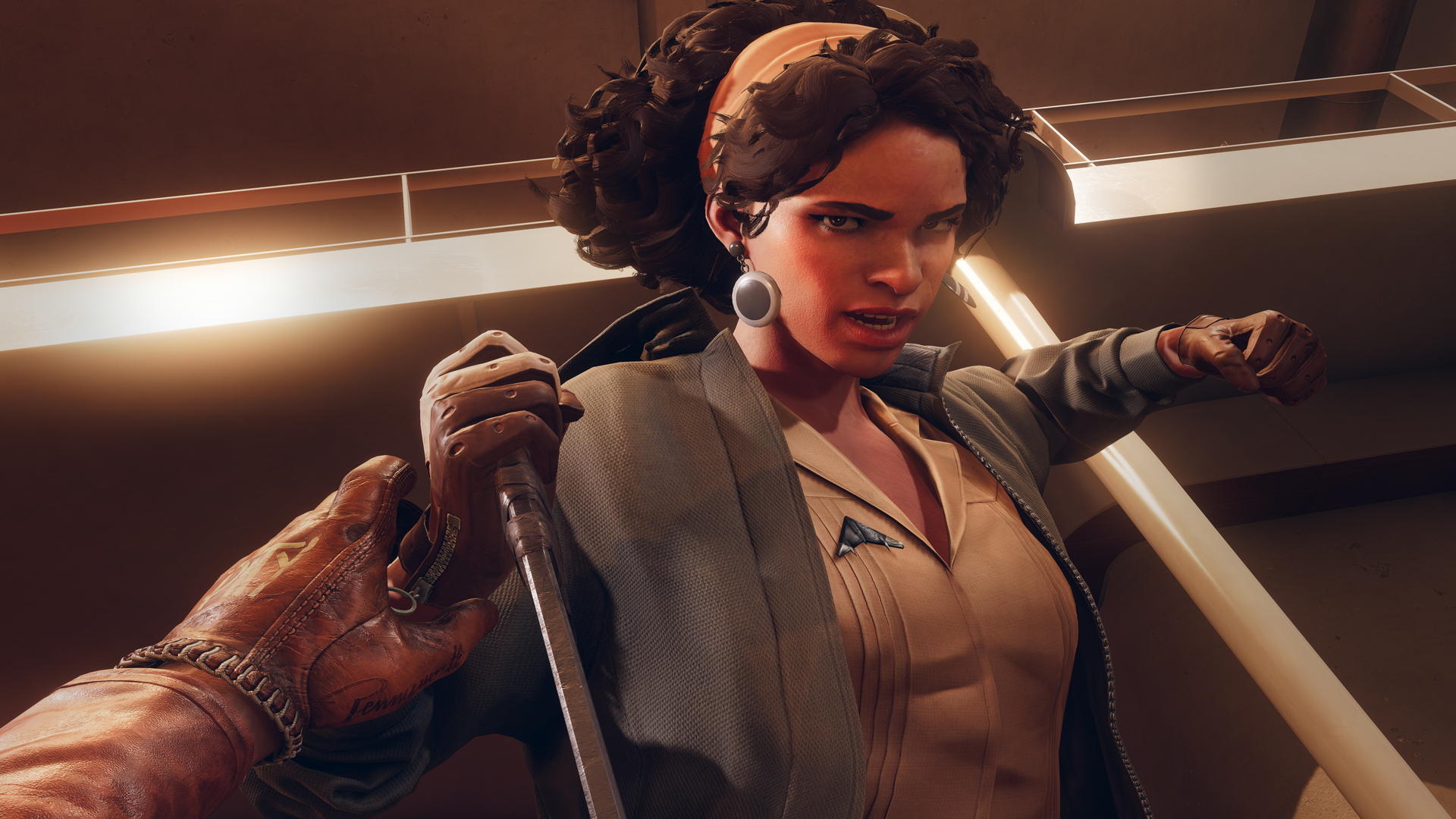
Release Date: September 14, 2021
Platform(s): PS5, PC
Developer: Arkane Studios
Publisher: Bethesda
Arkane sets its worlds apart by targeting coherence. Dunwall and Karnaca were high-concept, heavily industrialized cities peering off the edge of the world, but they felt lived-in – as if they were real places that Corvo Attano and Emily Kaldwin were actively disrupting. While working to secure Talos I, it seemed as if Morgan Yu really was rooting through a space station suspended in the past, a scientific experiment gone awry recounted one room at a time. Arkane didn't build these intricate environments just to impress, it did so to tell a layered narrative, and to immerse you in a specific place and time. Every object in an Arkane world is there for a reason. It's this characteristic of coherence that helped make Dishonored and Prey special.
It's exciting then to see the studio try something different with Deathloop. Blackreef might be Arkane's most artificial world yet. Your main point of interaction with its patchwork of spaces is through the barrels of some beautifully rendered weaponry. What we have in Blackreef is four creative, finely-crafted sets – each dressed to be seen during four periods of a single day – that are both self-contained and persistently tracking progress in what will at times feel like an impossible task: to assassinate eight targets in a single day, or die trying.
And you're going to die. Truth be told, you're going to die a lot. And I promise that you're going to enjoy it. You'll be shot, stabbed, and sent tumbling down cliff faces, splashing into the frigid waters that surround this island suspended in time. You'll choke, drown, be set on fire, and ground up into meat paste as you stalk rooftops in the morning, noon, afternoon, and night. As a reward for exploring enough to uncover a path less travelled, maybe you'll accidentally trap yourself in a depressurization chamber, or have your molecules obliterated by an unstable reactor. Death isn't to be feared in Deathloop, but embraced.
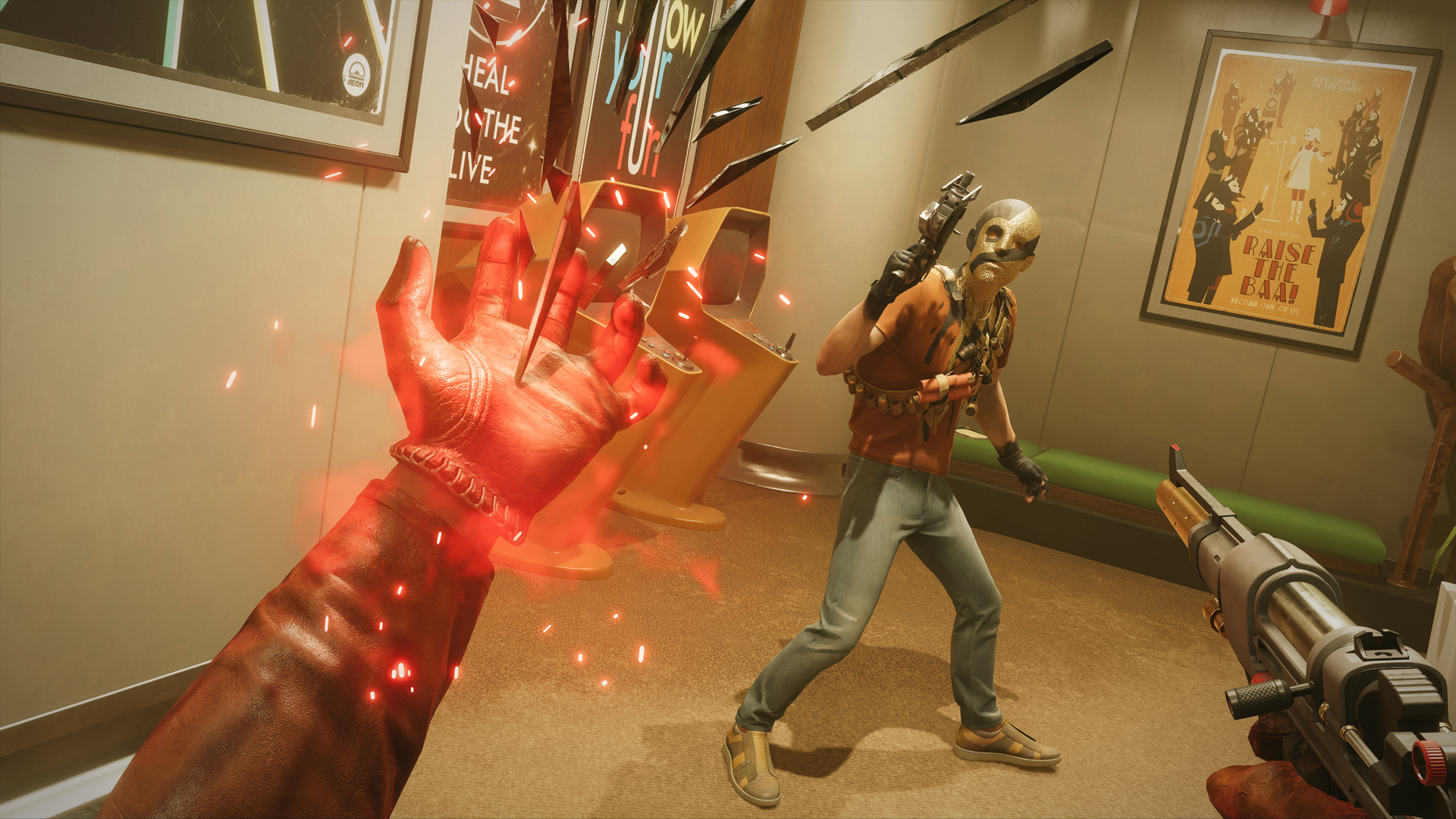
Dying is an opportunity to learn something new. About the layout of Blackreef's four districts, the eight Visionaries that must be assassinated, and the hordes of Eternalists that are hell bent on preventing it all from crashing down around them. Deathloop is less concerned about delivering a coherent lived-in world, with Arkane focusing its energy instead on building something that is consistent. That is key, because consistency allows you to internalize enemy placements and begin to use them to your advantage. Gradually, you'll discover how to retain your favorite weapons and awesome supernatural powers, even after dying. You'll work out where the Visionaries reside, the fastest routes to confront them, and, eventually, ways to encourage multiple targets to reside in a single location. The steady acquisition of knowledge is a more powerful weapon than any gun or power in Deathloop.
And it's all a lot of fun. When I said before that Blackreef felt artificial, that isn't necessarily a criticism. Deathloop has a different agenda to Dishonored and Prey. Blackreef is less a playground and more of a smartly-designed hedge maze; there's only one exit and, every time that you die, you're put back at the entrance; the story it wants to convey is one of escape and everything you do is in service of that.
What Arkane has built here in Deathloop is a multifaceted puzzle box. Blackreef doesn't feel fleshed out in the way Dunwall and Karnaca did. No matter how much reading of discarded notes you do, you won't get a real sense of why hundreds of masked Eternalists flocked to the island to escape the passage of time, why the Visionaries invested so much of themselves in preserving the loop, or how any of them live their lives in Deathloop's four dreamy technicolor districts. The people of Blackreef exist to die. To be whipped out of windows with telekinesis. To have their necks snapped over, and over, and over again. To stand rooted in place as you storm toward them with an SMG that heals you gripped in one hand and a hand-cannon that fires explosive rounds in the other. Deathloop doesn't excel as an out-and-out shooter, its turning circle and aim assist can feel sluggish in a way that Wolfenstein doesn't, for example – a series the studio has collaborated with MachineGames on in the past. But it sure is a hell of a good time to shoot a lot of people all the same.
Knowledge is power
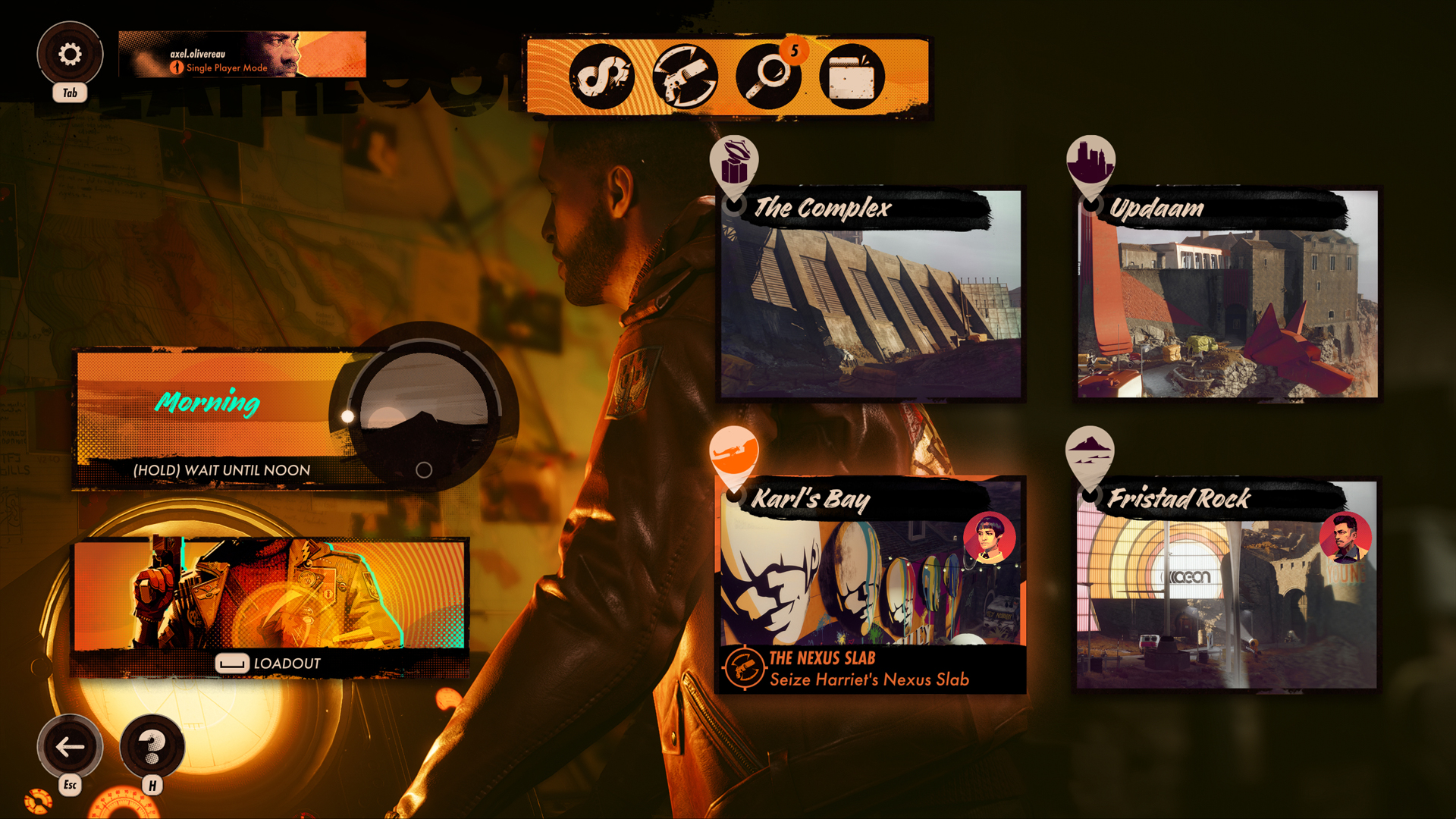
Deathloop isn't the first game to attempt a puzzle box in this new generation. IO Interactive's Hitman 3 arrived earlier this year and the difference between the two couldn't be more stark – both in terms of their visual aesthetic and style of play they encourage. If anything, the experience of playing Deathloop is the inverse of how you're traditionally pushed through something like a Hitman 3. IO designed a complexity curve that is narrow to begin with and gradually widens as you familiarise yourself with its overlapping systems, mechanics, and layouts. Its 'mission stories' can help even the most confused killers execute the most spectacular assassinations, steering players with waypoints and contextual clues through every step of the process. As you become more comfortable, IO gradually takes its hands off of your shoulders, leaving you to your own devices inside some truly stunning sandboxes.
Deathloop does the opposite. Arkane uses the opening hours to outline the big concept. To point to where each of the Visionaries initially reside and to teach you the basics of death, respawning, equipping weapons, and altering their utility with supernatural Trinkets. And then Arkane walks away, throwing you into Blackreef to be guided by little more than the occasional mission marker and your inherent desire to experiment. The first 15 hours of Deathloop are among its most entertaining, as you push against the world just to see how hard it will shove you back.
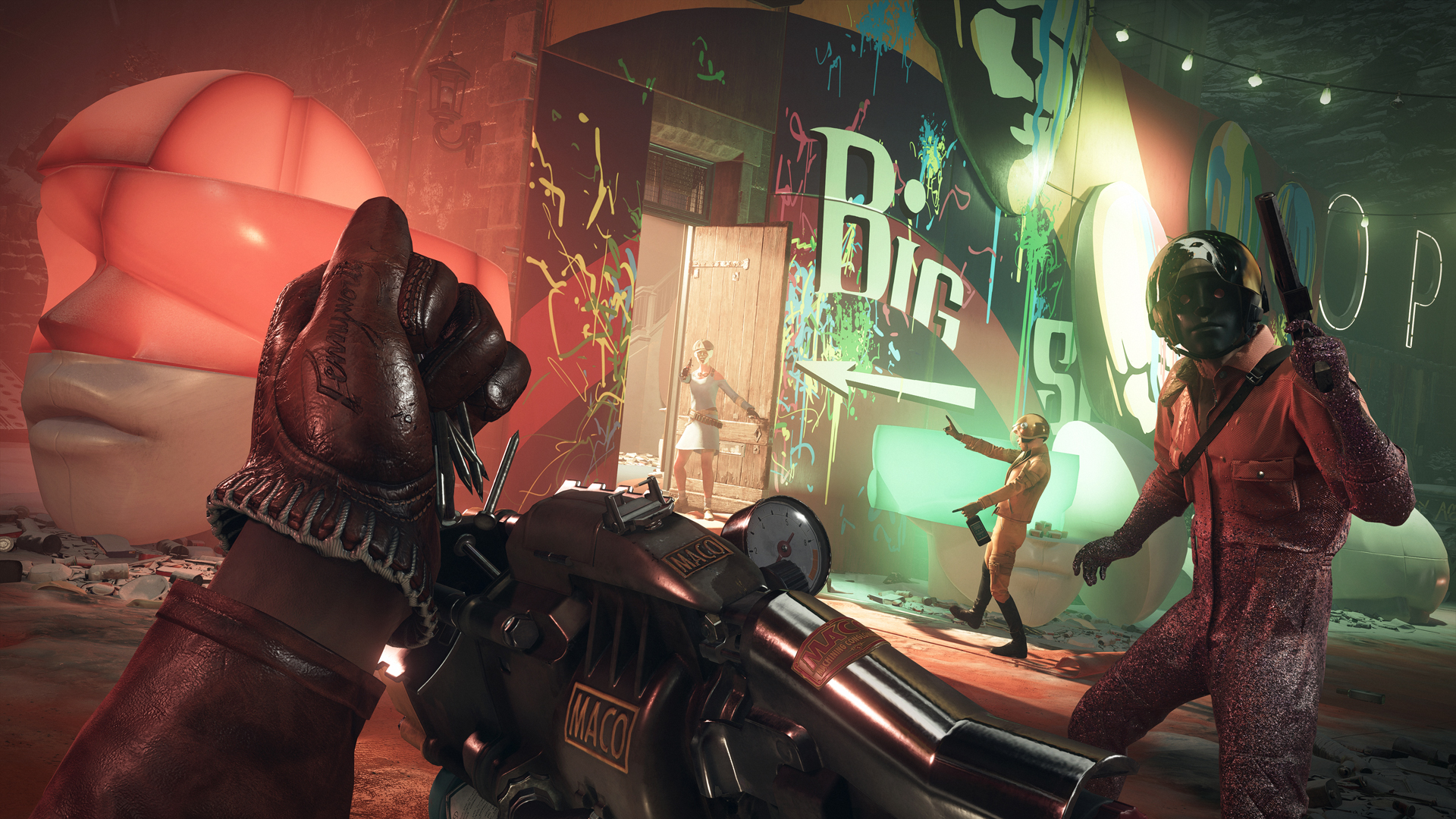
"The experience of playing Deathloop is the inverse of how you're traditionally pushed through something like a Hitman 3"
Eventually, Deathloop begins to contort. As you begin taking Visionaries down, collecting their unique weapons and Slabs – supernatural abilities, not bestowed upon you by An Outsider, but made by a few dozen annoying scientists in a laboratory – and discovering key information on how to break the cycle, the complexity curve begins to narrow and the scope of play with it. There's only one way to set the dominos and only one way to have them fall. Once you work out an element that's critical to breaking the loop, Deathloop celebrates it with an animated cutscene just to punctuate the point: you may have nothing but time, but it's time to stop wasting it.
In a sense then, Deathloop gets more linear as time goes on, until you're essentially speedrunning toward a cycle of murder that can topple all eight of the Visionaries. You stop utilizing non-essential locked passageways, hidden hideaways, and the verticality of the maps, as you may have done in the early hours, and begin to focus your attention on efficiency. Deathloop ceases to hint at new opportunities and starts offering solutions outright, with mission markers and menu indicators working to keep you on track. It's a fascinating twist, one that keeps Deathloop feeling fresh and focused all throughout its generous runtime. If I were to give you any advice, it would be not to rush toward the final objective; taking time to explore, discovering ways to streamline your runs through each area and time zone, is a good time worth savoring. The longer you can hold off on assembling the pieces of the puzzle, the better a time you'll have with Deathloop.
Die, die, and die again
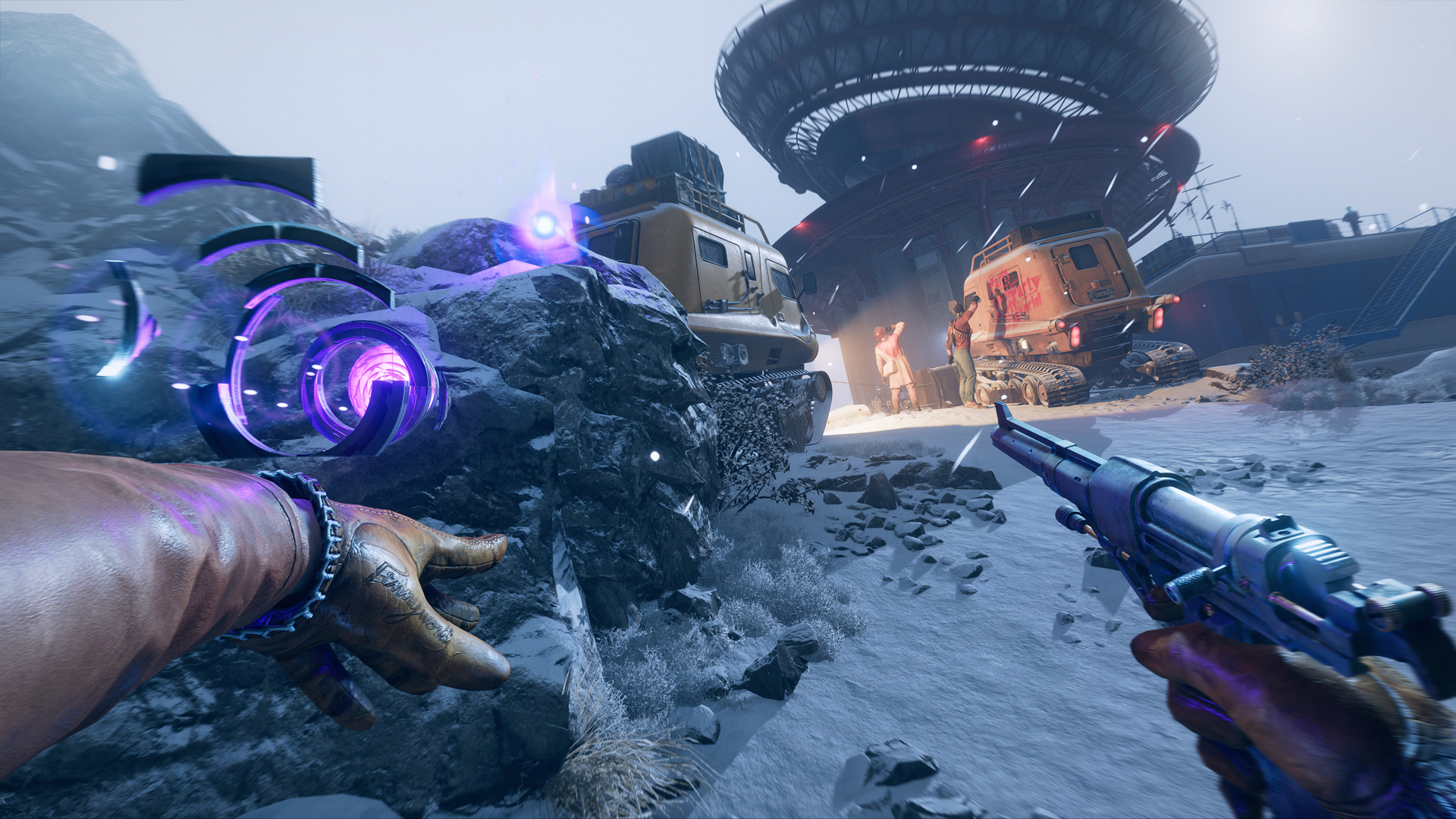
Even with Deathloop's focus narrowing over time, there is one element of randomization that will have a minor impact on your runs and that's Julianna – a small inconsistency in a game otherwise defined by its predictable patterns. Whether the rival assassin is controlled by AI or by another real player – whereby somebody across the world boots up Deathloop, chooses violence, and decides to invade your game from the menu – it's a nice touch that can very quickly increase the tension in your fingers, something the Eternalists and Visionaries eventually lose the ability to do. Listen, once you're able to clear all of Fristad Rock with little more than a pressurized nail gun and an intimate knowledge of both enemy and trap placement, Deathloop's pervading sense of challenge can begin to dissipate.
I thoroughly enjoyed my time with Deathloop. It wasn't what I thought it was going to be and it seemed to challenge my expectations without reservation. It's a murder mystery that's suspended in a time loop. It's a first-person shooter that features a shotgun that can transform into a rifle. It's a sci-fi spy adventure that's stuck in the '70s. It's all of these things and none of them at all. My impression of Deathloop seemed to shift with every passing hour and, as a result, it's difficult to not be impressed – if not thoroughly enthralled – with what Arkane has pieced together here. It's different, it's stylish, it's new. You won't play anything else quite like Deathloop for a very long time.
Deathloop was reviewed on PS5 with code provided by the publisher.

Josh West is the Editor-in-Chief of GamesRadar+. He has over 15 years experience in online and print journalism, and holds a BA (Hons) in Journalism and Feature Writing. Prior to starting his current position, Josh has served as GR+'s Features Editor and Deputy Editor of games™ magazine, and has freelanced for numerous publications including 3D Artist, Edge magazine, iCreate, Metal Hammer, Play, Retro Gamer, and SFX. Additionally, he has appeared on the BBC and ITV to provide expert comment, written for Scholastic books, edited a book for Hachette, and worked as the Assistant Producer of the Future Games Show. In his spare time, Josh likes to play bass guitar and video games. Years ago, he was in a few movies and TV shows that you've definitely seen but will never be able to spot him in.
